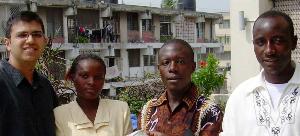|
|
Fourth African Conference of International Institute of Peace through Tourism
un articulo por Lou D'Amore
The fourth African Conference on Peace through Tourism of the IIPT (International Institute of Peace through Tourism) was held at the Kampala Serena Hotel, Kampala, Uganda from May 20 to 25, More than 400 delegates from 33 countries participated in the conference sharing their experiences, ideas, wisdom and commitments. The focus of the 4th IIPT African Conference was on the role and potential of tourism to contribute to the UN Millennium Development Goals, Poverty Reduction and Socio-Economic Development, Reconciliation and Healing Wounds of Conflict, and Expanding Market opportunities for Africa.
As well, the Conference sought to develop communication strategies leading to a more balanced and positive image of Africa - its lands, its cultures and its peoples- in regions throughout the world. Recommendations were made on stimulating development, creating employment, and generating local incomes through localized niche markets based on community tourism, cultural tourism, eco-tourism, agro-tourism, cultural tourism, and voluntourism. The most significant contributions would arise from supporting nature conservation and environmental protection and empowering local communities with capacity building in governance, cost benefit analysis, entrepreneurial skills and contract management.

Winners of IIPT prize for writing the best paper on "Building a Culture of Peace through Tourism": from left to right Nishit Chadavra IIPT Student Coordinator and Amina Chavula, Deodatus Mtaki and Atililio Mganwa.
Click on photo to enlarge.
The experience of South Africa through the Peace and Reconciliation Commission serves as a point of reference for similar processes of Reconciliation and healing wounds of conflict elsewhere. To be successful, there is a pre requisite for sincere reconciliation, community, state and/or nation building with assertion of legitimacy without exacting revenge.
There was consensus that the way forward for Africa is to establish tourism policy consistent with the MDG's, and to undertake collective action for image change through public and private investment in tourism. This to be accompanied by enhancement of equity in benefits from tourism to local host communities, thereby reducing poverty and the incidence of conflict.
The most significant outcome of the conference was the announcement by H.E. President Yoweri Kaguta Museveni in his Keynote Address that Uganda will adopt Tourism Legislation in support of the UN Millennium Development Goals. Uganda will be the first nation in the world to adopt this milestone legislation.
Other significant outcomes included:
• H.E. President Museveni Proclamation of May 20 to May 26 as “National Peace through Tourism Week”
• Launch of Uganda Martyr’s Trail as legacy of the Conference;
• Dedication of IIPT International Peace Park at Martyr’s Trail;
• Announcement of Four Sister Cities;
• Launch of Graduate Level Peace through Tourism Program at WICE (World Leisure Center of Excellence) Wageningen University in partnership with IIPT;
• Partnering of Makerere University with leading universities in Australia;
• IIPT Scholarship Award to Inter-disciplinary team of students writing the best paper on “Tourism Contribution to the UN Millennium Development Goals.”
• First Africa Media Exchange with participating journalists, editors and publishers from Africa, Europe and North America committed to enhancing the international image of Africa.
• Training Workshops regarding Hotel Revenue Management, Destination Marketing, Community Tourism, and Guiding
• Ministers Roundtables on Healing Wounds of Conflict through Tourism Culture and Sport; Enhancing the Contribution of Tourism to Poverty Reduction and the UN Millennium Development Goals; and the Africa Diaspora Heritage Trail.
The Conference was organized under the Patronage of His Excellency President Yoweri Kaguta Museveni and hosted by the Uganda Ministry of Tourism, Trade and Industry.
Partners in the Conference were the UN World Tourism Organization, World Bank, United Nations Environment Program, Africa Travel Association, and Counterpart International. Sponsors included the Bermuda Department of Tourism, Ministry of Tourism, Environment and Natural Resources, Republic of Zambia, and Jordan Tourism Board.
Further information is available on the IIPT website.
|








|
DISCUSSION
Pregunta(s) relacionada(s) al artículo :
How can tourism promote a culture of peace?,
* * * * *
Comentario más reciente:
Why tourism?
Can tourism be seen as an instrument to achieve complicity between people’s minds?
“There is nothing better that connects two people’s mind than a good conversation” The above quote could be used to describe the effect which tourism has on people. Like a great conversation, tourism could be said to play a vital role amongst people all over the world. It fosters communication in all its senses, intercultural dialogue and mutual understanding.
In today’s world it is evident that there is a shortage of moral or ethical values amongst people across the different nations in this world, resulting in a globalised world lacking these morals and ethical values. Ignorance, the failure to consider the needs of others, and selfishness are a few of the ways which hinder us from embracing diversity and a common human perspective, which would result informal empathy, internal moral compassion, tolerance of differences, historical consciousness and interpretation. The above mentioned features are intrinsic, inherent and can be found in the practice of tourism.
Tourism has been emphasized as one of the most effective instruments which continue to tackle to tackle social and economical poverty, as well as encourage the culture of peace practice amongst people. In looking at the UN architecture, one is able to see the growing implications which the tourism sector has on the world and world policies. . ... continuación.

|
|









